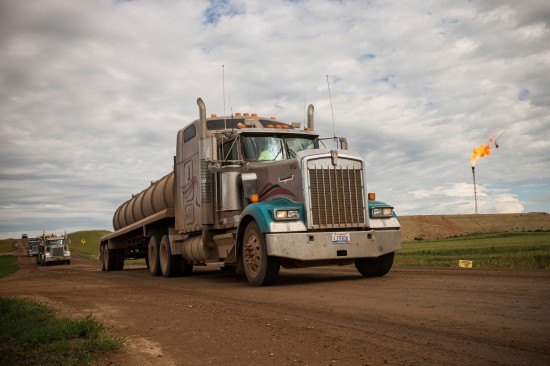Oil Booms Slowed Down By Weakening Roads
For the past few years, the oil booms in North Dakota and southern Texas have brought in a lot of money wherever oil could be drawn out. At the same time, the booms have taken their toll on amenities and infrastructure, the latter now the cause of slowing the boom down.
Bloomberg reports both states are increasing or seeking to increase their road maintenance and construction budgets as the literal weight of tanker truck upon tanker truck crushes current roads underfoot, slowing down oil production along with weather and exhausted wells.
North Dakota’s transportation department has boosted their budget to $800 million per year, $550 million more than the budget in 2007, while Texas’ department is crossing their fingers residents will vote yes to use $1.4 billion from the state’s oil-funded rainy day fund to go towards highway work instead. The legislature itself gave the department $225 million, with another $225 to the counties most affected by heavy truck traffic.
Aside from hindering oil production, the crumbling roads also bring more accidents — from tankers becoming stuck, to increases in fatalities — and add difficulties for other vehicles attempting to navigate what had once been a less-traveled path.
Seattle-based writer, blogger, and photographer for many a publication. Born in Louisville. Raised in Kansas. Where I lay my head is home.
More by Cameron Aubernon


































Comments
Join the conversation
Why is this a problem in the first place? British Columbia where I live has a huge industrial base and doesn't seem to have these problems. we have 45,000 km of paved highways but 367,000 km of gravel industrial roads (logging, mining, ranching etc.). My brother works for CanFor and he used to oversee a road and bridge network in an area several times larger than North Dakota.
Here's something to think about...in Texas all of the roads adjacent to the oil/gas producing properties are pooled into the leases, so the State in addition to severance taxes of 4.5 - 7.5% of production, is collecting royalties, just as the landowner would at 15 - 30% This windfall amounts to billions (with a "B") of dollars. The Texas Permanent University fund which goes to The UT and TAMU endowments is second only to Harvard at just under $30 billion dollars. Maybe they should use some of the new "found money" to repair the roads....
Too further add to the discussion: It is not feasible to build a pipeline or run a railroad spur to each oil/gas well that is drilled in generally remote areas. That requires trucks; lots of trucks; 1200-2800 total truckloads to drill and frac each well. That is what tears up the roads. Once enough wells are producing in an area, pipeline companies will run pipelines to collect the product and add to their system if economically feasible, if not the oil and condensate is stored in tanks and trucks collect periodically. In the case of natural gas the gas will routinely just be "flared off" if associated with oil and condensate production, or capped and wait for a pipeline to be run.
Another point I would like to make is the guys that work for the county that blade these dirt roads out here in ND are hopelessly over matched with too much work. To combat getting so far behind some of the counties just flat shut the roads down when its too wet. If your tanks are full you have to shut the well down until heavy trucking is authorized again. I'm sure people will say the county should hire more people to blade. The county can't pay enough to hire the people. An example of what goes on here is the sheriff of Kildeer ND just resigned for an oil job. Local governments can't keep or hire people even for good jobs like sheriff.